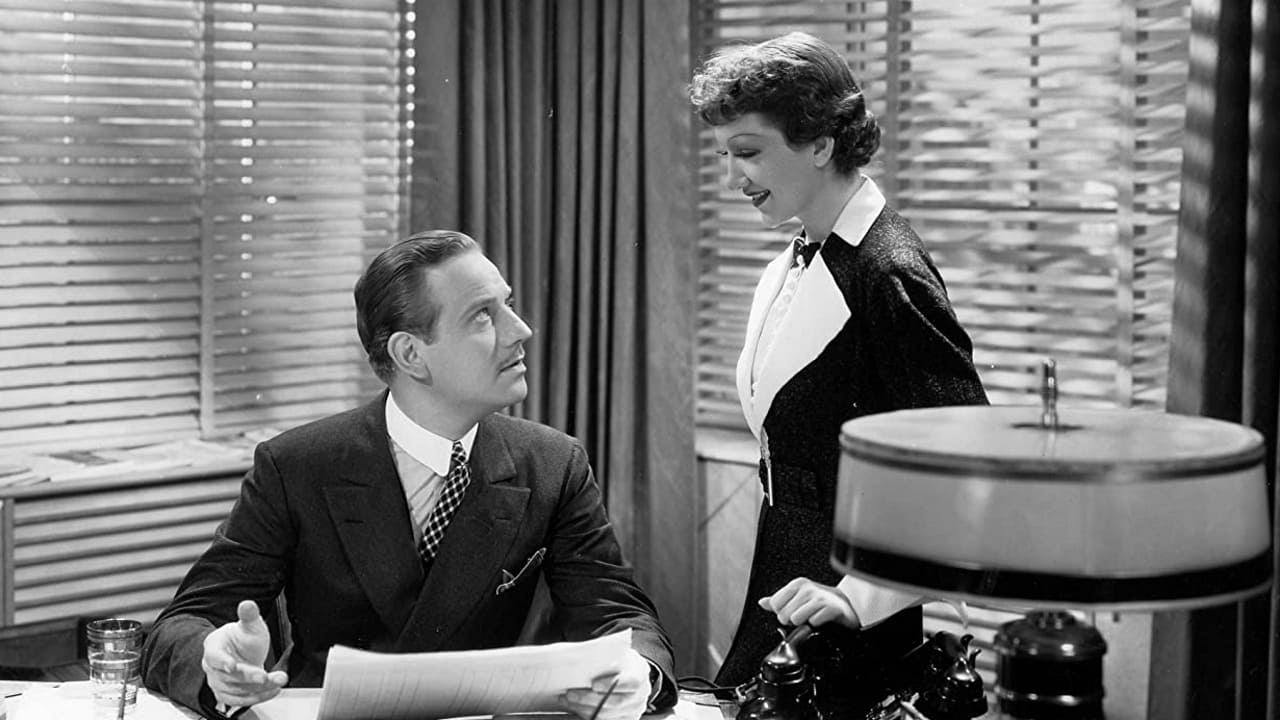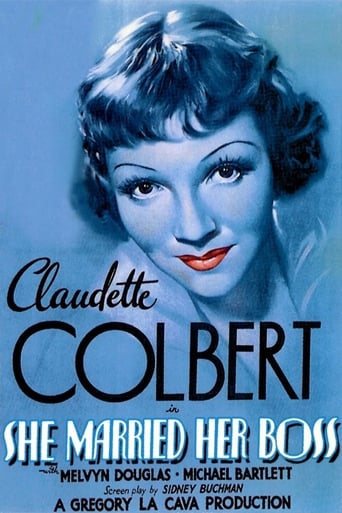

In the 1930's most studios seldom re-issued movies. But, Columbia was not run like the other major studios. If Harry Cohn had a week without a new film, he would dust off an older movie that he felt still could find an audience.I was only 3 in 1935, so I was not taken to the original release. I am sure my Granny had seen it because she crushed on Melvyn Douglas. But there could have been a secondary reason Granny took me to the 1938 re-issue. My parents were absolutely anti-spanking, while Granny make it clear she wanted me spanked early and often. Therefore she dragged me to every film she could find in which a child near my age was spanked.Claudette Colbert plays "Julia Scott" the Secretary; Edith Fellows (at 12 plays) "Annabel Barclay" at 9; Melvyn Douglas plays "Richard Barclay" the "Boss" and Annabel's father.These days most user reviews focus on the spanking, which was largely talk. Early in the film it is obvious that the super executive secretary is spanking the troubled daughter of her boss. You see Claudette pick up a hairbrush and pat it against her hand. The tells Annabel "This will hurt you more than me." The girl cowers and asks "What are you going to do?" Smash cut to the hall where the dotty yet sweet nanny and vicious aunt listed to rather crude sound effects of a spanking. Twenty running minutes later, and in story time a couple of days, Julia the secretary has married her boss Richard. At breakfast she tells Richard that she will not be going to the office because she is needed at home.Annabel is on both a hunger and talking strike. When Julia sits down wearing a lovely summer house dress, Richard is upset she will not ride to the office with him. Annabel has a tantrum saying she hates Julia. Once Richard leaves, the girl is cornered. Julia orders her uneaten breakfast be taken to her room. Then Julia reminds Annabel her first spanking was "just a paddy-whacking" but under the New Deal the girl will get an "old-fashioned walloping" which is not shown. But during that morning Julia and Annabel bond.Another 18 minutes of film pass, and a day or so in the story. Julia is at the office taking Richard to lunch. They discuss the playboy "Lenny" who just sold them his family department store. Richard can't find, and Julia knows he is with a lady pal of hers. Out of nowhere she says to Richard "He needs a spanking".I recorded this film from TCM on 5 April 2011, but having seen it on screen, I filed that DVD. When I adored Edith Fellows in "Five Peppers..." I dug out "She Married..." and find it good fun, but then I am now 80 and Granny is not around!
... View MoreShe Married Her Boss is one of those films where the title says it all, no need for any elaboration. Of course the bride is Claudette Colbert who's been crushing out on boss Melvyn Douglas for years.But before she's a bride Claudette is a secretary and a most efficient one at that. She's got the business well organized, but Douglas's home is something of a shambles with spoiled brat of a daughter Edith Fellows ruling the roost and some crooked household help ripping him off.So it's a business arrangement that Douglas has in mind when he marries Colbert. But he's slow on the uptake to realize that Colbert has romance in mind. Playboy Michael Bartlett is not slow however and he's got a nice singing voice to go with some oily charm.Colbert and Douglas get some nice support from folks like Raymond Walburn as the new butler who gets tanked with Douglas, Katharine Alexander as Douglas's snooty sister and Jean Dixon doing the Eve Arden part before Eve Arden was around.Gregory LaCava directed She Married Her Boss and we're certainly not seeing a director's cut. Harry Cohn's editors at Columbia Pictures butchered this one, the film ends rather abruptly though in truth you know where it all is going. And people who've had loved ones killed by drunk drivers won't find Raymond Walburn careening drunkenly through the streets behind the wheel all that funny.Still the stars and the planets do shine in She Married Her Boss.
... View MoreI've read the other comments that talked about aspects of this film that are dated, offensive, or just plain bizarre. I was rather surprised that no one brought up the movie's cringe-inducing gender stereotypes. Anyone who has seen Claudette Colbert or Melvyn Douglas in the films they made before the introduction of the Production Code(in mid-1934) would immediately recognize the heavy hand of the censors, who did their best to impose on Hollywood their narrow-minded idea of "family values." (On the basis of this film, it would appear that allowing married women to pursue a career would bring about the end of American society, but child abuse and drunk driving are just good clean fun!) Though the cast and plot look good on paper, the result is strained and uneven, as if the script had been written to Pre-Code standards and then hastily cleaned up so as not to offend the censors.Claudette Colbert plays Julia Scott, a bright, capable, and confident executive assistant at a large department store. She runs the busy office like a well-oiled machine and clearly enjoys the work. It's hard to fathom why she's spent six years mooning over her boss, Richard Barclay. The way the role of Barclay is written, the usually charming Melvyn Douglas comes off as a humorless, sexless cipher. All the more jarring, then, to hear Julia talk about her desire to give up her terrific job and marry Barclay. Without a trace of irony, she describes marriage as "a woman's REAL career." Okay, she wants to get married. But why on earth would the lovely and vivacious Julia want Barclay as a husband? Not only is he dull as ditch-water, he treats her as if she were a piece of super-efficient office equipment. Once they're married, he ridicules her for assuming the stereotypical role of housewife, despite the fact that she's set his chaotic home in order and tamed his obnoxious brat of a daughter. There's nothing in the movie to explain Barclay's eventual change of heart; apparently it's brought on by a quart of whiskey. So much for good old "family values." The film is so devoid of any hint of sexual attraction that we don't see a single cuddle or smooch--not even at the very end when it's clear that the newlyweds will finally get around to doing what newlyweds are famous for doing. Julia has more physical contact (and chemistry) with Leonard Rogers, her sweet-tempered playboy suitor, who's a lot more appealing as husband material than that cold fish Barclay.Solid performances are turned in by familiar actors in some of the secondary roles: Raymond Walburn as the perfect butler; Katherine Alexander as Barclay's drama-queen sister; Edith Fellows as the evil daughter; and especially Jean Dixon as Julia's wise-cracking, matchmaking best friend.Would love to have seen this film made just a year earlier, before the Hays Office started taking their moralizing hatchet to so many of the things that made movies of the 30s worth watching.
... View MoreMost modern viewers of 1930's comedies will be accustomed to the necessity of suspending disbelief and modern sensibilities to entirely enjoy these films. However, She Married Her Boss contains one or two scenes which make this a difficult task. The main problematic scene is the drunk driving scene which is sufficiently reckless as to be just plain alarming to modern audiences but fortunately occurs at the end of the movie so as not to be troubling throughout. The second such scene however is the (aural) scene of Julia (Claudette Colbert) spanking Anabelle several times with a hairbrush. In modern times, with the idea of physically punishing children being so controversial, this scene refuses to simply fade into the background of the film and become simply a comedic scene and lingers in a slight feeling of unease in watching the remainder of the film despite Annabelle's growing affection for Julia. Simliarly Julia's friends taunts of Annabelle appear somewhat cruel; being adults ganging up on an unhappy child, no matter how obnoxious her behaviour.Although some of the comedic aspects of the film may not translate to a modern audience, the film nevertheless contains some gems of serious scenes - Claudette Colbert's reaction to her husband mocking her for behaving like a woman and his criticism that she is making their marriage "just like any other marriage". Similarly the shop dummy scene can be enjoyed on a number of levels, the drunken comedy is delightful but also wonderful is Colbert's pained expression and declaration that "Julia doesn't live here anymore". Finally my favourite scene of the film, when Melvyn Douglass confronts Colbert after her antics in the shop window appear in the press, effectively calling her "second hand goods". Colberts reactions from resignation, to pride to hurt to confrontation are a pure acting lesson.While some of the comedy may struggle to appeal to modern audiences, the scene of the new bride (Colbert) being carried over the thresh-hold by her new husband's butler remains one of the funniest moments in 1930's comedy and Julia's kicking of the child shop dummy (surely a reaction to her troubled step-daughter) remains a guilty pleasure so that despite some reservations the film continues to work on both the dramatic and comedic levels despite some need to be prepared more than usual to put modern considerations aside to entirely enjoy this.
... View More